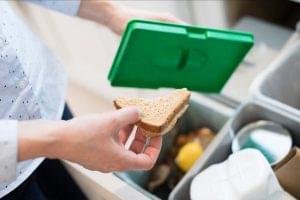Bakery products end up in the bin the most, durable food and meat the least
The vast majority of Hungarians consider themselves to be conscious consumers, despite this, 59% of our compatriots throw away food, and 23% especially a lot – according to the data of the representative survey by HonestFood, which was prepared on the occasion of World Food Day on October 16. A significant part of those who participated in the survey (86%) shop consciously to save money, environmental protection aspects are approx. every second is considered Hungarian.

October 16 is World Food Day, the purpose of which is to draw attention to, among other things, food waste. KOMETA 99 Zrt. from Kaposvár joined the donation convoy initiated by the FAO and the Hungarian Food Bank for the sixth time. – We consider the work of the Food Bank important, so far this year we have delivered nearly 44,000 products to them. In addition to helping the needy, our common cause is also the fight against food waste. – said Giacomo Pedranzini, managing director of KOMETA 99. Zrt., creator of the HonestFood concept. HonestFood is on the one hand about environmental protection and respect for animals at the corporate level, but at the same time it is also about consumer responsibility. In their representative survey, they looked for the answer to how consciously Hungarians shop, what their main motivations are, and what kind of food they throw away the most. In the case of the latter, it also gives prevention tips.
The majority consider themselves to be conscious shoppers, but they also throw food away by their own admission
More than nine out of ten Hungarians consider themselves conscious buyers. 41% do not throw away any food, either because they shop very consciously (17.6%) or because when they have a surplus, they process or sell it (23.5%). 36% are those who consider themselves conscious shoppers, but nevertheless sometimes throw away food. Overall, this is most typical for the adult population, for both women (32%) and men (39%). According to their own admission, about every fourth Hungarian (23%) throws a lot of food in the trash. 70% of those who throw away a lot of food know that they should be more aware, but 30% are left cold by this topic, i.e. 7% of Hungarians are not bothered at all if food ends up in the bin.
Thrift is more important for women, and environmental protection is more important for men
Almost every second Hungarian (46%) admits that they shop consciously because environmental protection and savings are both important to them. Four out of ten respondents consciously shop for savings, and environmental protection is a decisive factor for 6% of respondents. Economy is a much more important aspect for women (90%) than for men (82%), and environmental protection is more important for men (54%) than for women (48%). According to their confession, 8% of the participants in the survey do not buy consciously (men: 9%, women: 6%).
Conscious shopping = sale monitoring?
Price sensitivity is also supported by the fact that for 80% of the survey participants, there is a close connection between shopping and saving. For the majority of respondents (32%), conscious shopping means that they keep an eye on sales and are able to go to several places to buy everything at the best price. For every 4th Hungarian, the planned menu and the related shopping list represent awareness and that they do not buy anything other than what is on the list. 22% buy a larger package because it is cheaper, and after purchasing, they pay close attention to the expiration date so that the food does not end up in the trash. For two out of ten Hungarians, it is not the price that decides, but rather they choose a small package to ensure that it runs out.
We throw away baked goods the most, durable food and meat the least – tips against wasting baked goods
HonestFood’s research also asked what type of food we throw away the most. For the majority of respondents (31%), baked goods most often end up in the trash, and every fourth Hungarian throws away ready-made meals. Vegetables and fruits lose their freshness so much that they have to be thrown away by every fifth respondent, and dairy products by 12% of our compatriots. We throw out the least durable food, meat and meat products (4% of the former, 6% of the latter). – Unless the baked goods are moldy, there are plenty of ways to use them even after they are cracked or dry. Let’s think about it, there are specific dishes that are not made with fresh baked goods, e.g. poppy seeds, meatloaf. But we can make breadcrumbs ourselves from a dried bun, which can last for months. We can also plan a hot sandwich dinner per week, which is also perfect for using small pieces of cheese and drier sausages. In fact, we can even freeze the excess baked goods. – Antal Emese, dietitian, sociologist, professional leader of the TÉT Platform, shared his tips against the waste of baked goods.
Related news
Mol and the University of Pannonia have completed a successful consortium project
Mol and Pannon University have concluded a successful consortium project…
Read more >FAO: Global food prices rose to more than a year-and-a-half high in November
Global food prices rose to their highest level since April…
Read more >Related news
Most major grocery chains will keep their stores open until noon on December 24th
Most of the large grocery chains will keep their stores…
Read more >Recognition of Consumer Protection Excellence: Honoring the Best of 2024
This year’s outstanding consumer protection officers and special award recipients…
Read more >The Joy of Giving! – SPAR stores collect non-perishable food for people in need
The Hungarian Maltese Charity Service and SPAR Hungary have launched…
Read more >








